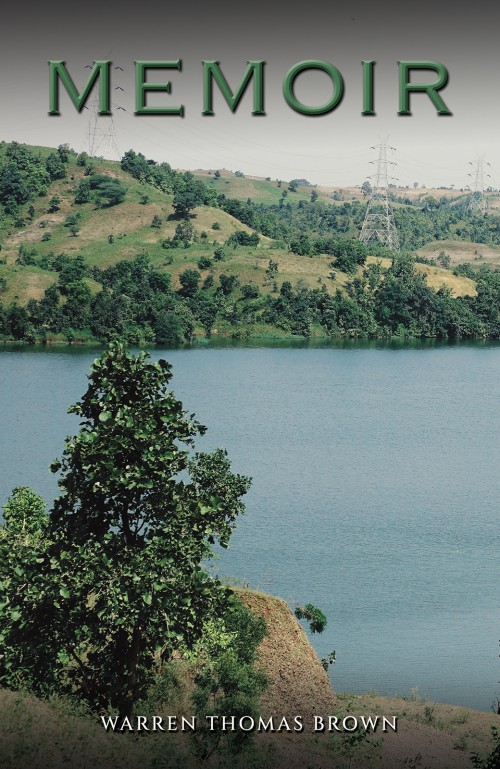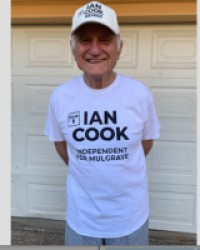
*Available directly from our distributors, click the Available On tab below

Warren Brown was raised in a rural area outside Gympie, a town in Queensland, Australia. He completed his primary education at the age of twelve by attending one-teacher schools and gained entry to the Institution of Civil Engineers as a chartered engineer by passing the examinations set by that institution after private study while working in the construction industry. He spent the early part of his life in the construction industry and was responsible for management of construction of three dams, one a major structure. He spent a lot of his life in legal disputes and finished his career as the principal of a mid-sized civil engineering consultancy.
One of the people who built the Six Mile Creek dam, now a well known Noosa Council landmark near Cooroy, was former Gympie man and now-retired engineer Warren Brown. He grew up on a small farm at Wilsons Pocket, when a handshake was a deal and a person's word was their bond, at least where he came from. Not always true in business, nor the public service he later learned. His book, Memoir, launched at Twiga Books in Mary St, tells of struggle and betrayal in a way which is often amusing, if only because it happened to someone else. Written with the acknowledged help of his brother, the late Geoff Brown and Geoff's wife, Dr Elaine Brown, a noted Gympie district historian and author, the book is also an insight into a forgotten and more innocent time. His father was a carrier, delivering cream to market and returning with goods needed on the farms. He and Geoff slept on the partly closed-in verandah of the family home, bought on a handshake from an owner who acknowleded the deal and kept his word. Working in construction, he studied engineering at night. He saved his wages and made some reasonably spectacular stock market investments, making enough to buy an interest in a small engineering firm. His work on the Borumba Dam began a professional career characterised in large part by legal battles with the bureacucracy, prompting Mr Brown to say he had met several people who had done time in jail, all of them with higher ethics than some of the senior public servants he had dealt with. And so he ultimately found himself involved in building the Six Mile Creek Dam, which holds back Lake Macdonald, at Cooroy. "Building a dam is about the most complex engineering project that one can undertake," he says. "It involves the whole range of civil disciplines under the most extreme conditions." It was his firm's second contract. The principal of the contract was Noosa Shire Council, whose engineers had also not previously designed anything similar. The job started well in dry weather. Getting the bulldozer in was one challenge, with the collapse of a timber bridge on the way. Then came the wet season. It must have seemed that nothing could go right. "Every day the forecast was the same, 'clearing showers in the morning and fine in the afternoon'. It rained continuously for twenty-eight days and then the forecasts changed to rain and the rain ceased." A long range weather forecast they paid for to get something more reliable was so wrong, Mr Brown recalls it could not have been worse if the forecaster had known the weather and predicted the opposite. "We could not work in the intense rain, so we had no income and that put us under considerable financial pressure. And the firm's lawyers were not much help. "I remember the day our claims were settled at a day-long conference in Brisbane as about the hardest in my life, (but) we finished with a satisfactory financial result."
I would like to leave a rating of 4 out of 5 for ‘Memoir’. The book's editing is commendable, with well-chosen chapter lengths and comfortable page formatting that enhance the reading experience. Warren Thomas Brow provides an honest and transparent view of the working and legal environment in Australia during the mid-20th century. This book will appeal to readers interested in this period of Australian history. The author uses simple and easy-to-understand language, offering an authentic perspective on his experiences. This is especially helpful for readers who may not have extensive knowledge of that era in Australia. The narrative begins with his childhood as a farmer's son, detailing daily life and family dynamics. Including a family tree would have clarified this part of the story. The book then progresses to his education, the challenges of becoming an engineer, and the hostile legal conditions he faced on various projects. Knowing how difficult it was to be an engineer back then, given the technology, work environment, and pressure from authorities, is intriguing and enlightening. Reflecting on the past work environment and legal conditions makes me appreciate our current situation more. The author provides a comprehensive view of the engineering field and exposes the harsh realities imposed by authorities. The inclusion of photos is particularly helpful, as it can be challenging to envision the site conditions through words alone. My only suggestion is that the book's focus on various projects can become repetitive, causing a loss of concentration. Including more about his personal life would make the memoir more holistic and engaging. In conclusion, ‘Memoir’ is a compelling read that offers a transparent view of the engineering industry in Australia during the mid-20th century. I would love to see more of the author's personal life included to provide a more comprehensive view of the era.
Warren Brown’s “Memoir” is an interesting story of his life, from his early upbringing in a rural community south of Gympie, his education, his training as a professional civil engineer, his career as a civil engineering contractor, and as a civil engineering consultant in soils testing. Warren’s account of his early years and of his career as a civil engineer, is one of resourcefulness, enterprising in endeavour and ever entrepreneurial in his approach. He suffered at the hands of public servants administering contracts he had won – even to the extent of sending him broke at one stage. His story is an interesting perspective of development work in Queensland post World War II, and gives insights to some challenging projects that Warren completed. His decision to give up gaining his degree in Civil Engineering at Qld University and instead gaining his qualifications through on the job working under the auspices of the Institution of Engineers Australia and sitting their exams, is unusual. I expect Warren’s “Memoir” will be of great interest to others of the civil engineering profession who worked in the same era and his detailed descriptions of his construction equipment on particular jobs would bring back memories.
Being from England, I was keen to read Warren’s memoirs about his boyhood and career when he first mentioned his writing to me.
I was absolutely enthralled by Warren’s accounts of his early post-WWII life in the Queensland country town of Gympie, such as his early adventures (misadventures?) into entrepreneurship - ‘The Great Mango Adventure’ being just one. Then follows his gradual progression to being a young and naïve engineer working in the wild north of Australia. The hardships faced, and his development as a green Civil Engineer taking on the established malpractices of some business and local councils as he fought to develop proper roads and bridges, are well chronicled. At times his forays into this forbidding country led to life-threatening dangers that only a mixture of ingenuity and good fortune enabled him to survive.
There are necessary explanations of what he did and why, but even to someone with no engineering background, it can be understood and acknowledged how the responsibility often fell to him to do the right and proper thing.
Nothing is stated as such in his memoirs, but it can be gauged from his relationships with his partners, business people and various civic leaders the respect that was given, often grudgingly, to his expertise in overcoming difficult engineering assignments. Nonetheless, many times he had to overcome the pettiness of minor bureaucrats who were resentful of the achievements of this clever young man.
In his writing Warren has shown himself to be a man who is literate, well read and having a love of poetry. He is a man of honour and wisdom, qualities that shine through in his writing. As a boy, Warren remembers listening to a serial on the radio in his early days that seemed to start with the same beginning each week… “It is about a man living with Faith and Courage to rebuild the world that was.”
This could well be a description of Warren Brown.
And if you don’t know what a spalling hammer is, this book is for you! (345)
We use cookies on this site to enhance your user experience and for marketing purposes.
By clicking any link on this page you are giving your consent for us to set cookies